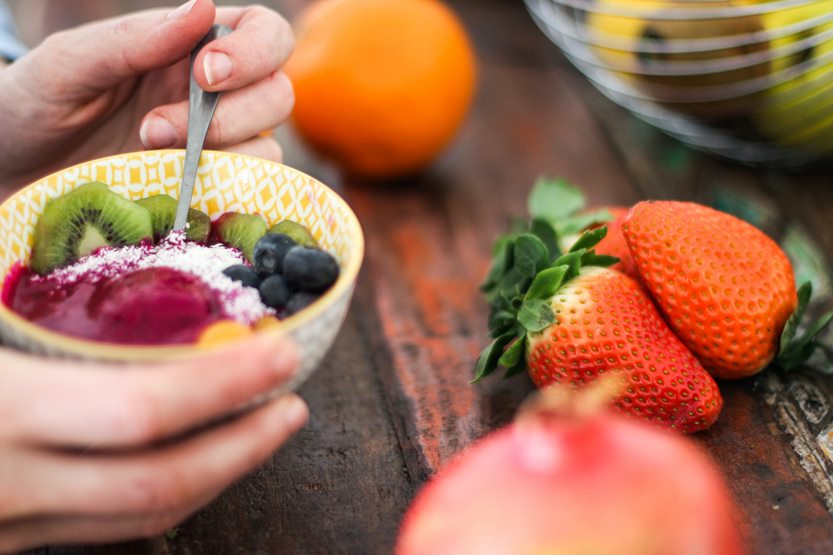Recent studies have shown eating foods that are considered healthy for your gut can be effective in solving a range of other medical issues.
When my mum was 48, she began to eat a consistent gut-healthy diet. For as long as my mum could remember she always had problems with her skin. What started as childhood eczema, turned into rashes and sores she could no longer maintain.
Doctors could never provide a reason or cause for her skin disease, instead only offered a short-term cute in the form of steroid cream. And eventually even this began to fail and she was asked to take steroids in tablet form. That was when her immune system broke down and she developed shingles.
Finally, a doctor diagnosed her with leaky gut – a term my mum and the rest of our family had never heard before.
In an attempt to heal her gut, she cut out sugar and saturated fats out of her diet. Slowly, her skin began to heal and her immune system started to improve. We never realised the foods she was eating played such a large part on her health.
Gut health can be a huge factor in the health and wellbeing of our bodies, but this concept is still unknown and undiscussed to the wider population.
What does it mean to have a healthy gut?
A gut healthy diet means eating foods that help the good bacteria to remain in the gut. The ‘gut’ that’s being referred to here is the gastrointestinal tract which includes the mouth, oesophagus, stomach, pancreas, liver, gallbladder, small intestine, colon and rectum. Of most important are the micro-organisms that live in the large intestine.
Our bodies contain millions of microbes that are beneficial to our health. Our large intestines or gut contains the most microbes and therefore plays a huge role in our digestion and immune function. But we can damage these good microbes when we maintain a low-fibre, fat-filled diet.
Signs you should be eating healthier for your gut
Naturopathic Doctor, Rosia Parrish, says that there are a number of symptoms that our body produces to let us know we have an unhealthy gut. These can range from:
- Stomach discomfort, like consistent gas, bloating, diarrhoea, constipation and abdominal pain
- Irritable bowel syndrome (IBS)
- Fatigue or chronic fatigue syndrome
- Food cravings (especially sugar)
- Weight change
- Skin irritation like acne, psoriasis and eczema
- Food and skin allergies
- Autoimmune conditions like rheumatoid arthritis, ulcerative colitis and multiple sclerosis
- Mood issues such as anxiety and depression
- Migraines
Following a gut healthy diet
A gut healthy diet is one that is fibre-rich and fibre-diverse filled with wholegrains, fruits, vegetables and other plant-based foods. Fibre is beneficial as it prevents and manages many common gut related disorders. Ideal fibre-rich foods:
- Yoghurt (sugar-free and full-fat)
- Vegetables such as artichokes, green peas, sweet potatoes and broccoli
- Fruits such as bananas, raspberries and oranges
- Legumes such as chickpeas, lentils and beans
Fermented foods are also considered ideal in order to maintain a gut-healthy diet. The process of fermenting converts the sugars in food to organic acids that are good for your body. Some fermented foods for gut health include:
- Kimchi
- Sauerkraut
- Kefir
- Kombucha
Many of the foods listed are rich in a type of bacteria called lactobacilli, a bacteria that benefits health. Eating a gut-healthy diet will increase the lactobacilli in our intestines and reduce the Enterobacteriaceae, a bacteria associated with inflammation and chronic diseases.
Foods to avoid
Just like how fibre-rich and fermented foods contribute to good gut bacteria, other foods can create bad gut bacteria. These are foods that are packed with sugar, are highly processed and artificially sweet.
These can all lead to inflammation in your gut. Medical News Today list some of the worst ones as:
- Foods with fructose corn syrup or sorbitol
- Fruit juice
- Condiments such as jam, relish and hummus
- Foods with antibiotics in them (including meat)
- Fried foods
Other aspects that affect gut health
Whilst the food we eat is the primary factor that affects our gut, there are also other factors that can damage it.
One of the most common is adequate sleep. Getting enough sleep is essential for the upkeep of gut health. It is recommended that those trying to maintain a healthy gut sleep before 12am and get at least seven and a half hours to eight hours.
In conjunction with getting enough sleep is maintaining regular exercise. Maintaining regular exercise can reduce stress levels and maintain a healthy weight. Both of which can have a positive effect on gut health.

The benefits of gut health
According to UC Davis Health, the gut is the centre of our bodies and by nurturing its healthy bacteria, our bodies’ immune cells can ward off infectious agents like bacteria, viruses and fungi. A healthy gut also communicates with the brain through our nerves and hormones which helps maintain our well-being.
New research conducted by the, Journal of Trends in Food Science and Technology, has shown that a healthy gut microflora can provide protection against gastrointestinal disorders, inflammatory bowel diseases and even cancer. In some cases, it can also prevent atopic diseases such as asthma and dermatitis or eczema.
What to remember before beginning a gut healthy diet
When trying new diets for gut-health or even diets such as keto, begin by cutting certain foods out bit by bit. Pay attention to what foods bring negative change to your body and attempt at cutting it out. When trying recommended foods for your gut, also ensure that they are not playing a negative impact on your health. If you find that your body is not adjusting to a certain food, you might be intolerant to it and you should book an appointment with your GP.




